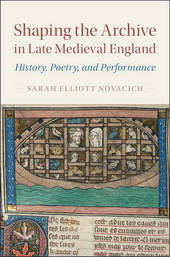
|
Shaping the Archive in Late Medieval England: History, Poetry, and Performance
Hardback
Main Details
| Title |
Shaping the Archive in Late Medieval England: History, Poetry, and Performance
|
| Authors and Contributors |
By (author) Sarah Elliott Novacich
|
| Series | Cambridge Studies in Medieval Literature |
|---|
| Physical Properties |
| Format:Hardback | | Pages:230 | | Dimensions(mm): Height 235,Width 158 |
|
| Category/Genre | Literary studies - general
Oral history
Christianity |
|---|
| ISBN/Barcode |
9781107177055
|
| Classifications | Dewey:820.9382 |
|---|
| Audience | | Professional & Vocational | |
|---|
| Illustrations |
Worked examples or Exercises; 5 Halftones, black and white
|
|
Publishing Details |
| Publisher |
Cambridge University Press
|
| Imprint |
Cambridge University Press
|
| Publication Date |
10 March 2017 |
| Publication Country |
United Kingdom
|
Description
Sarah Elliott Novacich explores how medieval thinkers pondered the ethics and pleasures of the archive. She traces three episodes of sacred history - the loss of Eden, the loading of Noah's ark, and the Harrowing of Hell - across works of poetry, performance records, and iconography in order to demonstrate how medieval artists turned to sacred history to think through aspects of cultural transmission. Performances of the loss of Eden blur the relationship between original and record; stories of Noah's ark foreground the difficulty of compiling inventories; and engagements with the Harrowing of Hell suggest the impossibility of separating the past from the present. Reading Middle English plays alongside chronicles, poetry, and works of visual art, Shaping the Archive in Late Medieval England considers how poetic form, staging logistics, and the status of performance all contribute to our understanding of the ways in which medieval thinkers imagined the archive.
Author Biography
Sarah Elliott Novacich is an assistant professor at Rutgers University, New Jersey, where she specializes in medieval literature. Her research interests include poetry, drama, gender studies, and visual culture.
Reviews'The examples she [Novacich] chooses out of representations of sacred history in drama and poetry offer an elegant case study of how literature might explicate a historical crisis, providing a brilliant argument for even greater exchange between fields in the humanities.' Hannah Leah Crumme, Renaissance Quarterly
|